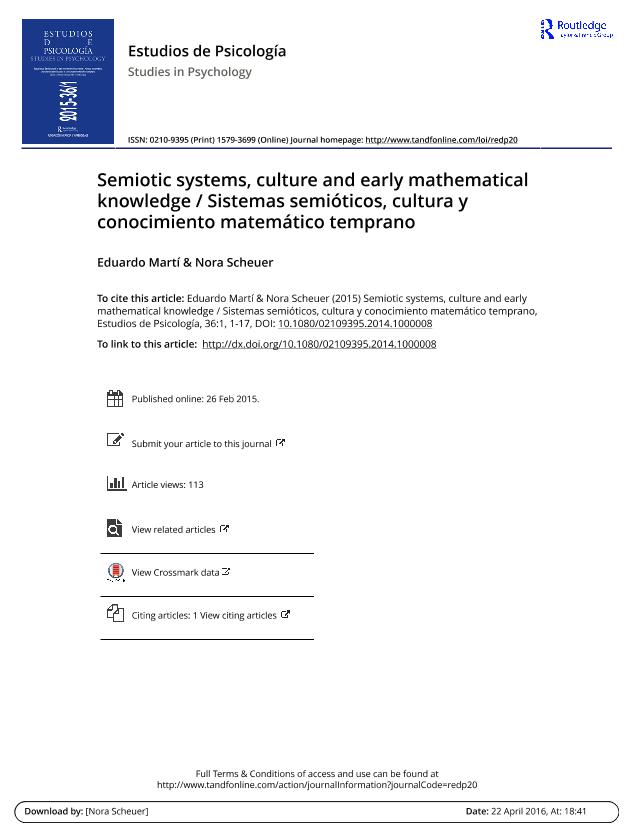Mostrar el registro sencillo del ítem
dc.contributor.author
Martí, Eduardo
dc.contributor.author
Scheuer, Nora

dc.date.available
2021-03-03T19:20:09Z
dc.date.issued
2015-02-26
dc.identifier.citation
Martí, Eduardo; Scheuer, Nora; Semiotic systems, culture and early mathematical knowledge; Taylor & Francis Ltd; Estudios de Psicologia; 36; 1; 26-2-2015; 1-17
dc.identifier.issn
0210-9395
dc.identifier.uri
http://hdl.handle.net/11336/127339
dc.description.abstract
In this introduction to the issue Semiotic tools in early mathematical knowledge, we offer a theoretical perspective that provides meaning to the different contributions. We begin by reviewing three perspectives bearing an important influence on the study of mathematical development in childhood (the Piagetian, the information processing and the neonativist perspectives). Next, we underscore the need for developmental studies in this domain to consider the semiotic component, and hence the socio-cultural component, in depth. The contributions that form this volume — a theoretical article, five papers and four short reports of empirical studies and a review of an instructional approach — illustrate different ways of including the semiotic component in the study of children’s mathematical knowledge.
dc.description.abstract
En esta introducción del monográfico titulado Instrumentos semióticos en el conocimiento matemático temprano se ofrece una perspectiva teórica que da sentido a las diferentes aportaciones reunidas. Tras la revisión de tres perspectivas influyentes en el estudio del desarrollo matemático (la perspectiva de Piaget, la perspectiva del procesamiento de la información y la perspectiva neonativista), se defiende la necesidad de que los estudios en este campo consideren en profundidad el componente semiótico, y por tanto, el componente socio-cultural. Con los trabajos del presente monográfico —un artículo teórico, cinco artículos y cuatro reportes de estudios empíricos y una reseña de un modelo de enseñanza— se ilustran diferentes maneras de incluir el componente semiótico en el estudio del desarrollo matemático en la niñez.
dc.format
application/pdf
dc.language.iso
eng
dc.publisher
Taylor & Francis Ltd

dc.rights
info:eu-repo/semantics/openAccess
dc.rights.uri
https://creativecommons.org/licenses/by-nc-sa/2.5/ar/
dc.subject
DEVELOPMENT
dc.subject
MATHEMATICAL KNOWLEDGE
dc.subject
SEMIOTIC SYSTEMS
dc.subject
SOCIOCULTURAL INTERACTION
dc.subject.classification
Otras Psicología

dc.subject.classification
Psicología

dc.subject.classification
CIENCIAS SOCIALES

dc.title
Semiotic systems, culture and early mathematical knowledge
dc.title
Sistemas semióticos, cultura y conocimiento matemático temprano
dc.type
info:eu-repo/semantics/article
dc.type
info:ar-repo/semantics/artículo
dc.type
info:eu-repo/semantics/publishedVersion
dc.date.updated
2021-02-26T19:17:02Z
dc.identifier.eissn
1579-3699
dc.journal.volume
36
dc.journal.number
1
dc.journal.pagination
1-17
dc.journal.pais
Reino Unido

dc.journal.ciudad
Oxford
dc.description.fil
Fil: Martí, Eduardo. Universidad de Barcelona; España
dc.description.fil
Fil: Scheuer, Nora. Universidad Nacional del Comahue. Centro Regional Universitario Bariloche; Argentina. Consejo Nacional de Investigaciones Científicas y Técnicas. Centro Científico Tecnológico Conicet - Patagonia Norte; Argentina
dc.journal.title
Estudios de Psicologia
dc.relation.alternativeid
info:eu-repo/semantics/altIdentifier/doi/http://dx.doi.org/10.1080/02109395.2014.1000008
dc.relation.alternativeid
info:eu-repo/semantics/altIdentifier/url/https://www.tandfonline.com/doi/abs/10.1080/02109395.2014.1000008
Archivos asociados
